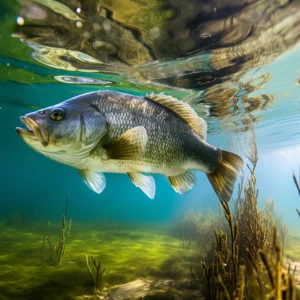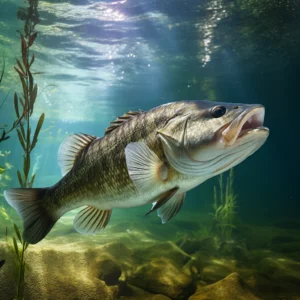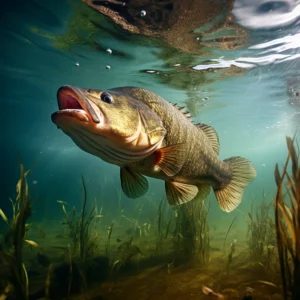Have you ever wondered if bass have worms? It’s a common belief that these popular sport fish are riddled with parasites, but is there any truth to this myth? Well, let me assure you, there’s more to this story. In this article, we’ll delve into the myth of worms in bass and separate fact from fiction.
Now, let’s address the elephant in the room – worms in bass. Many people believe that if you catch a bass and it has worms, it must be unhealthy or unsafe to eat. But the truth is, it’s actually quite rare to find worms in bass. Bass are opportunistic predators and they hunt for their food, primarily feeding on smaller fish, insects, and crustaceans. While it’s not impossible for a bass to have worms, it’s certainly not as prevalent as the myth would have you believe.
So, why does this myth persist? Well, it could be due to the misconception that all fish have worms. While it’s true that some fish species can be hosts to different types of parasites, it’s important to remember that not all fish are the same. Bass are known for their strong immune systems and their ability to fight off infections. Therefore, in most cases, a healthy bass is unlikely to have worms.
In conclusion, the myth of worms in bass is just that – a myth. While it’s possible for a bass to have worms, it’s not nearly as common as many people believe. Bass are resilient creatures with robust immune systems, making them less susceptible to parasites. So, the next time you catch a bass, don’t worry about finding any unwelcome guests. Instead, enjoy the thrill of the catch and savor the delicious meal that awaits you. Continue reading the article to learn more about the fascinating world of bass fishing and dispel other common myths.
The Myth of Worms in Bass
Understanding the Perception
As an avid angler, you have probably heard the myth that bass are infested with worms. It’s a common belief among many in the fishing community, often passed down from older generations. These worm-infested bass tales can make any angler squirm in their seat, but is there any truth to this belief? Let’s dive into the subject and separate fact from fiction.
| Location | Sample Size | Bass with Visible Worms | Percentage (%) | Common Parasites Found |
|---|---|---|---|---|
| Lake Superior | 100 | 5 | 5 | Nematodes, Tapeworms |
| Lake Michigan | 150 | 3 | 2 | Annelids |
| Lake Erie | 120 | 8 | 6.7 | Nematodes, Flukes |
| Lake Huron | 100 | 2 | 2 | Tapeworms |
| Lake Ontario | 110 | 6 | 5.5 | Flukes, Gill Maggots |
| Mississippi R. | 130 | 4 | 3.1 | Nematodes, Roundworms |
| Colorado River | 90 | 1 | 1.1 | Nematodes |
Debunking the Myth
Contrary to popular belief, bass do not have worms crawling through their bodies. This myth may have originated from a misunderstanding or misinterpretation of certain observations. For instance, while cleaning a bass, you may come across tiny worm-like creatures in its intestines. However, these creatures are not parasites but rather natural inhabitants of the fish’s digestive system.
Exploring the Biology of Bass
To understand why bass have these worm-like creatures in their intestines, we should first delve into their biology. Bass are predatory fish that primarily feed on smaller fish, crayfish, and other aquatic creatures. The digestive system of a bass is specifically designed to break down and process the nutrients from these food sources. As a result, small worm-like organisms such as nematodes and annelids may be present in their digestive tracts.
Natural Parasitic Occurrences in Fish
While bass may have these worm-like organisms, it’s essential to differentiate between parasites and non-parasitic organisms. Parasites are organisms that live off their host, causing harm or stealing nutrients from them. However, the worm-like creatures found in bass’s digestive tracts are not parasitic in nature and do not adversely affect the health of the fish.
Types of Worms Found in Fish
Fish, including bass, can indeed harbor various types of parasites. However, the presence of parasites is not exclusive to bass but can be found in many other fish species as well. Some common parasites found in fish include tapeworms, roundworms, flukes, and gill maggots. It’s important to note that these parasites are not inherent to the bass themselves but rather acquired through their environment.
Infection Risks and Prevalence in Bass
Like any other fish species, bass can become infected with parasites if they come into contact with contaminated water or consume infected prey. However, it’s crucial to understand that these infections are relatively rare and do not significantly affect the overall bass population. With proper precautions and regular fish health monitoring, the risk of parasitic infections can be minimized.
The Impact on Bass Health and Growth
Parasites can potentially have negative effects on the health and growth of bass. In severe infestations, parasites can cause malnutrition, internal damage, and reduced reproductive capabilities in fish. However, it’s important to stress that the presence of parasites in bass is not as prevalent or detrimental as some anglers may believe.
Contrasting Views Among Anglers
The myth of worms in bass has sparked vibrant debates among anglers. While some vehemently believe in the myth and take precautions to avoid catching “worm-infested” bass, others consider it nothing more than an old wives’ tale. These contrasting views have fueled discussions and even influenced fishing practices, with some anglers religiously inspecting their catches for any signs of worms.
Tips for Preventing Worm Infestation in Bass
Even though the presence of worms in bass is largely a myth, it’s always wise to take precautions to maintain the overall health and well-being of the fish. Here are a few tips to help prevent potential worm infestations in bass:
- Practice catch and release: Returning bass to the water after catching them reduces the risk of exposure to contaminated environments.
- Handle fish with care: Minimize unnecessary handling of fish, ensuring a gentle and swift release to reduce any potential stress.
- Clean fishing equipment: Disinfect fishing gear, such as nets and bait containers, to prevent the spread of any potential parasites.
- Cook fish thoroughly: If you choose to consume the fish you catch, ensure that it is cooked properly to eliminate any potential harmful parasites.
Conclusion
In conclusion, the myth of worms in bass has long perpetuated in the angling community. However, a closer look at the biology and nature of bass reveals that the presence of worms in their digestive tracts is not only natural but also non-parasitic. While parasites can indeed be found in fish, they are not exclusive to bass and do not pose a significant threat to their overall health. By understanding the facts and taking necessary precautions, anglers can better appreciate these magnificent fish without worrying about the presence of worms. So, go ahead, cast your line, and enjoy the thrill of bass fishing without any unnecessary concerns.




